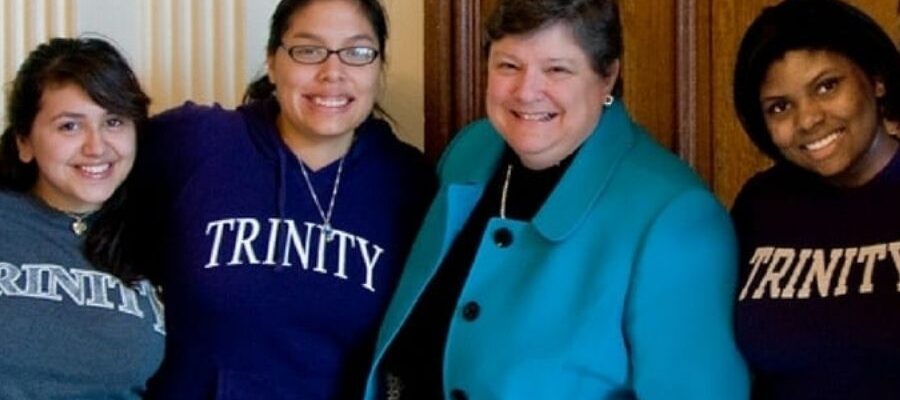
This article initially appeared in the Summer 2023 issue of our magazine, 'Sowing Goodness.' The full issue is available here.
Trinity Washington University, a Catholic women’s college in Washington, D.C., owes its existence to the persistence of the Sisters of Notre Dame de Namur, who arrived in the city in 1873 and established several schools for women. Three industrial schools quickly evolved to St. Aloysius Elementary School for girls and then the Academy, all at North Capitol and K Streets. In 1897, after learning that women were being rejected from Catholic University, the Sisters were determined to start their own Catholic college for women. Despite opposition from some conservative individuals who went all the way to the Vatican to try and block the plans, the Sisters persisted and even made a trip to appeal to the Cardinal in Atlantic City. They returned successful and Trinity was founded.

Trinity Washington University President Patricia McGuire and students.
Trinity Washington University President Patricia McGuire, who assumed the role in 1989, is amazed by what the Sisters accomplished and said, “It would be hard for us to replicate today what they were able to do on their own. Part of what keeps us focused and moving forward is the memory of the grit, determination, and courage of our founders.” As an alumna and member of the Trinity Board of Trustees, President McGuire knew that the school she attended in the 1970s was facing so many societal changes.
She saw an opportunity for the college to enter a new chapter including a shift in focus towards recruiting low-income women of color from the local area. She also discovered that many of the working women who had once participated in the innovative Weekend College that began in the 1980s had daughters who now also wanted to come to Trinity. The combination of going out to the local schools and the Weekend College legacy recruiting grew enrollment and changed the student body profile.
Trinity now enrolls about 2,000 students in three academic schools: College of Arts and Sciences, School of Nursing and Health Professions, and School of Professional and Graduate Studies. The vast majority of the student body are Black and Hispanic lower-income students, making Trinity one of only three private colleges to be classified by the U.S. Department of Education as both a Predominantly Black Institution and a Hispanic Serving Institution. A new tuition assistance program, encouraging students to apply for grants, along with a successful scholarship program supported by philanthropists in the D.C. area has made the dream of a college degree a reality.
Sister Ann Howard, SNDdeN, has served as the Director of Campus Ministry at Trinity since 2016. She knows how hard the students work and that many might not have the opportunity to study at Trinity were it not for the generosity of benefactors. She was reminded again of the positive impact this has on the students when she recently overheard a young woman sharing why she chose to attend Trinity, saying, “I am a strong woman, and I wanted to be surrounded by strong women.” Sister Ann is very optimistic about the future of Trinity and said, “These young women will be running Trinity one day. I think of President McGuire, for example, who was a graduate herself. I have great faith in the future.”
Trinity proudly celebrated its 125th anniversary in October 2022 and alumnae were invited to explore campus, visit classes and talk with anyone. They had the opportunity to connect with current students and faculty and the alums were dazzled and so proud. Today, the school is thriving and there is a great deal of pride in and affirmation of Trinity.
President McGuire regularly reminds students of the importance of the founding mission of Trinity, and said, “The Sisters ofNotre Dame de Namur would not have flourished if foundress St. Julie Billiart had stopped when the bishop told her to do so. And Trinity would not have been founded if they stopped when the Pope said he didn’t want them to start this college. We are all here today because they persisted.”
